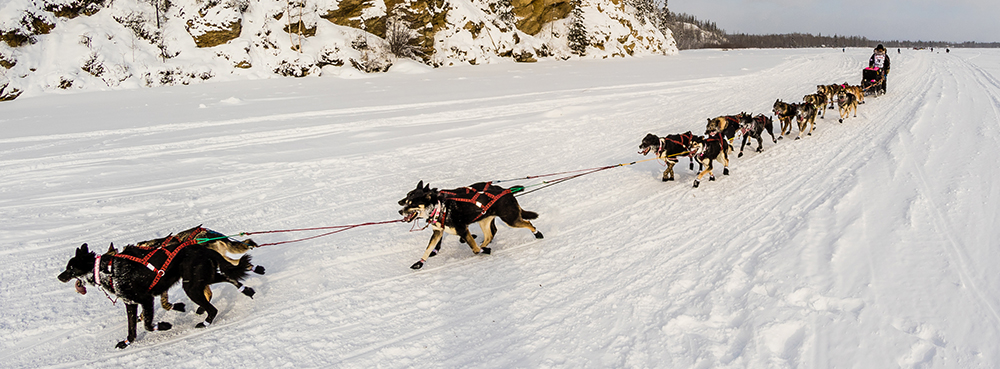
Union Musher and USA Member Races the Iditarod
By PJ DelHomme
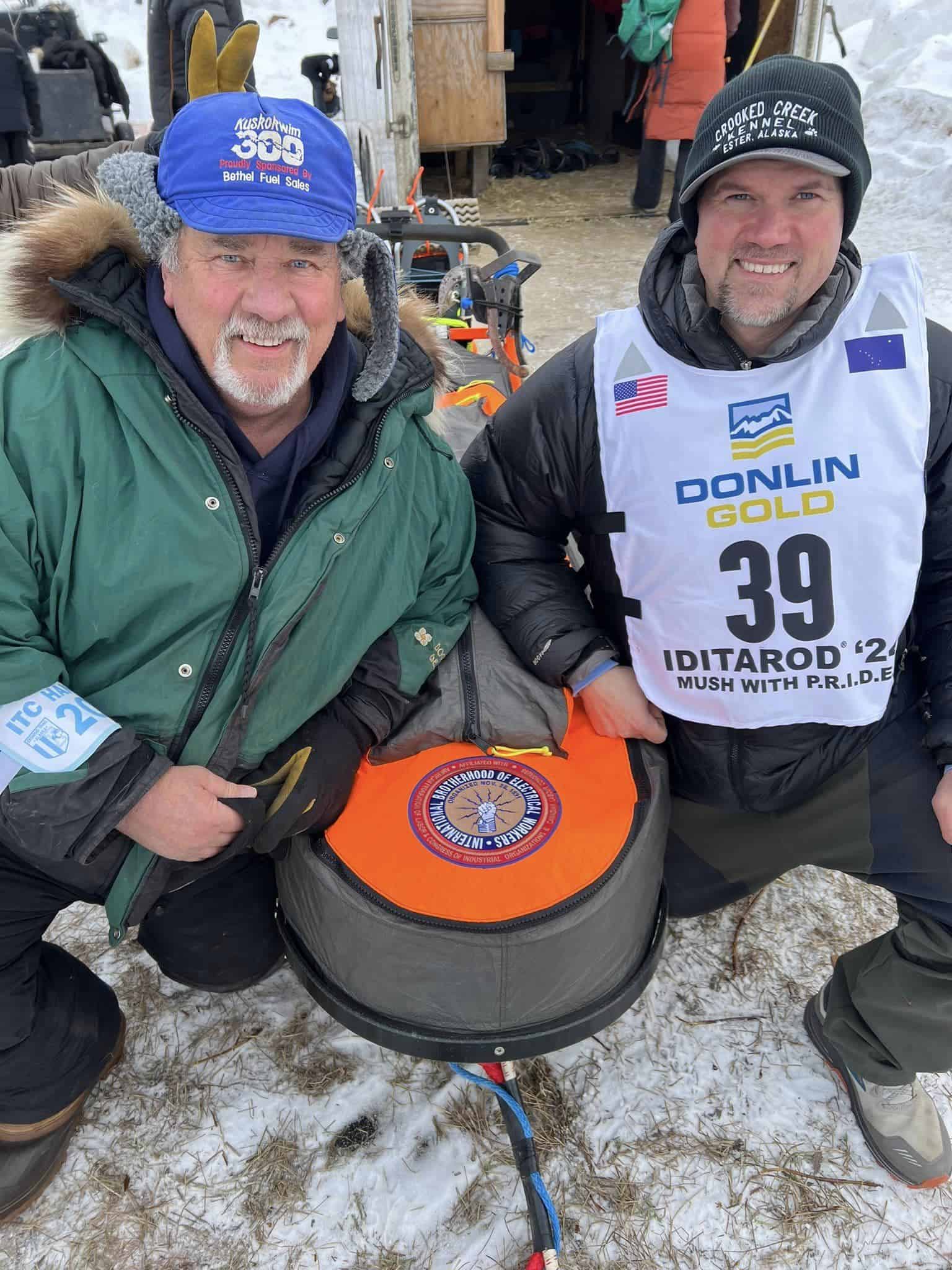
Wally Robinson (R) and his dad, Walter Robinson Sr.
Wally Robinson leads a double life. He’s an electrician and a proud 23-year member of IBEW Local 1547 in Alaska, which helps fuel his mushing habit. He’s also been a member of the USA for more than a decade. Robinson has been dogsledding since he was a kid growing up in Michigan. This past March, he competed in the Iditarod, a 1,000-mile race across Alaska that pits mushers and their dog teams against the most brutal conditions on the planet, including angry wildlife.
Mushing Roots
As a kid, Robinson remembers when he went ice fishing with his dad and saw mushers from a local race coming down the trail. Right then, he knew he wanted a piece of that action. Initially, he hooked up his coon hounds to a sled that he used at the local sledding hill for a test run. Then, he used the $250 he saved by working on a dairy farm to buy a real sled. He got some actual sled dogs, too. He dreamed of running the Iditarod, the pinnacle event for dog mushers and their teams.
While in high school in Michigan’s Upper Peninsula, Robinson befriended mushers there who had run the Iditarod. They encouraged him to move to Alaska, so he did in 1999 after graduating. He worked a couple of years for a top kennel and compared it to an apprenticeship with the union. In 2001, he ran his first Iditarod, placing 40th out of a field of nearly 70 mushers.
“After that race, I realized that I probably needed to start a career to support my mushing,” he said. Because his dad and grandfather were electricians and members of IBEW, he followed that path.
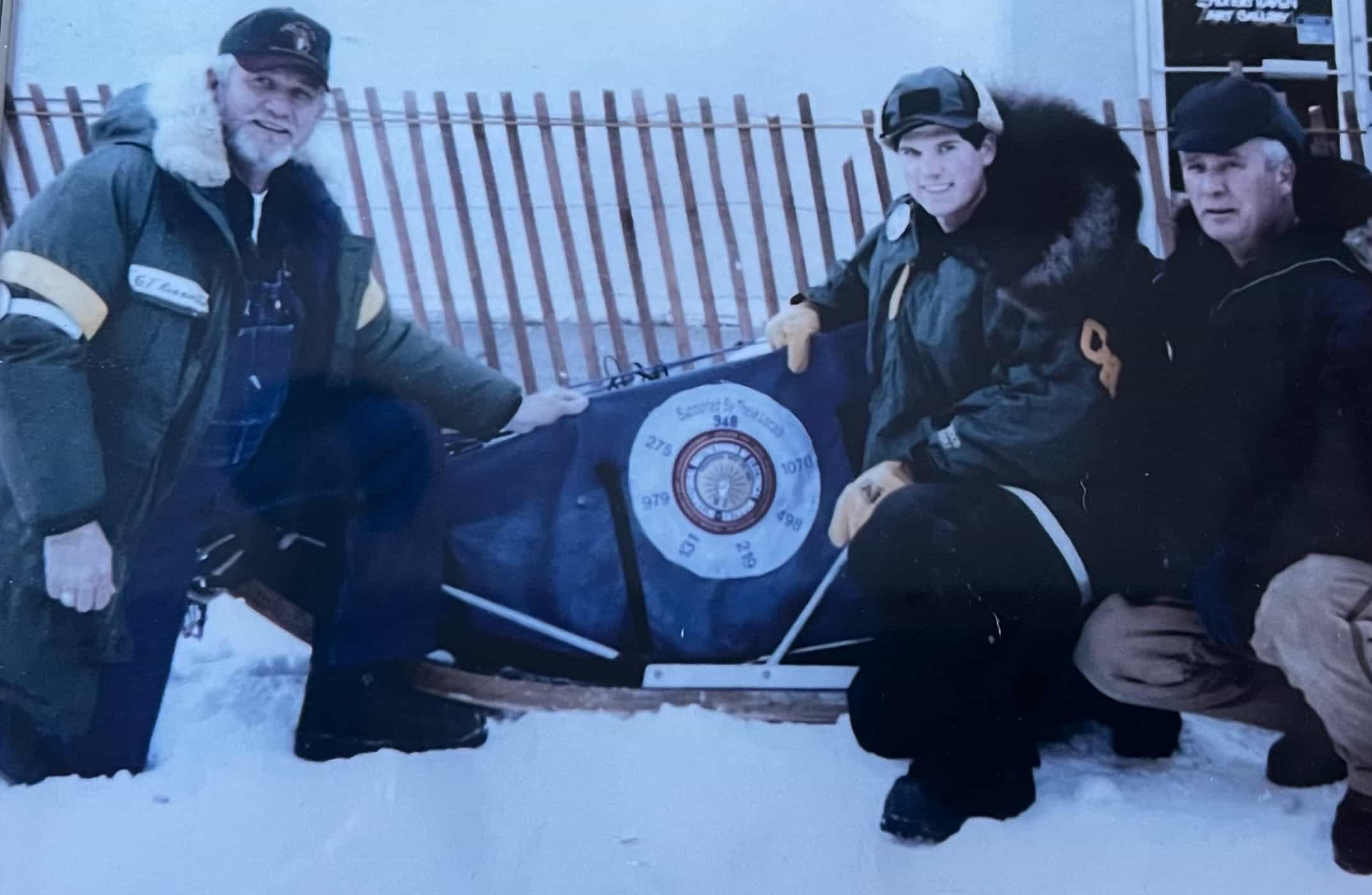
Wally Robinson’s first Iditarod in 2001. (L-R) Wally’s uncle George Robinson (IBEW Local 275 business manager), Wally Robinson, and Wally’s dad Walter Robinson Sr. (IBEW Local 979 president).
Union Support
After a five-year apprenticeship, Robinson started working as an electrician and was then asked to work in the local union hall, where he stayed for 10 years. Two years ago, he left and returned to work in the field as an electrician. “It was an awesome experience working with and for the union,” he says.
Over the years, Robinson’s mushing habit caught the attention of several union groups, who pitched in to help with the substantial cost of racing and raising sled dogs. Robinson Racing Kennels has 28 adult dogs and eight pups. The family spends $25,000 annually on dog food alone. And then there’s the bootie budget. All of his dogs wear booties on their feet, and they wear out or fall off. At $1.25 each, 2,500 booties add up every year.
When he ran the Iditarod in 2001, Teamsters Local 406 and others in Michigan helped support him. He also gets major support from Alaska Laborers Local 942, IBEW Local 1547, Fairbanks Central Labor Council, and others.
“Without being in a union and all the support we have received from unions, we would not be able to do this,” Robinson said. “Our dog team runs on union power.”
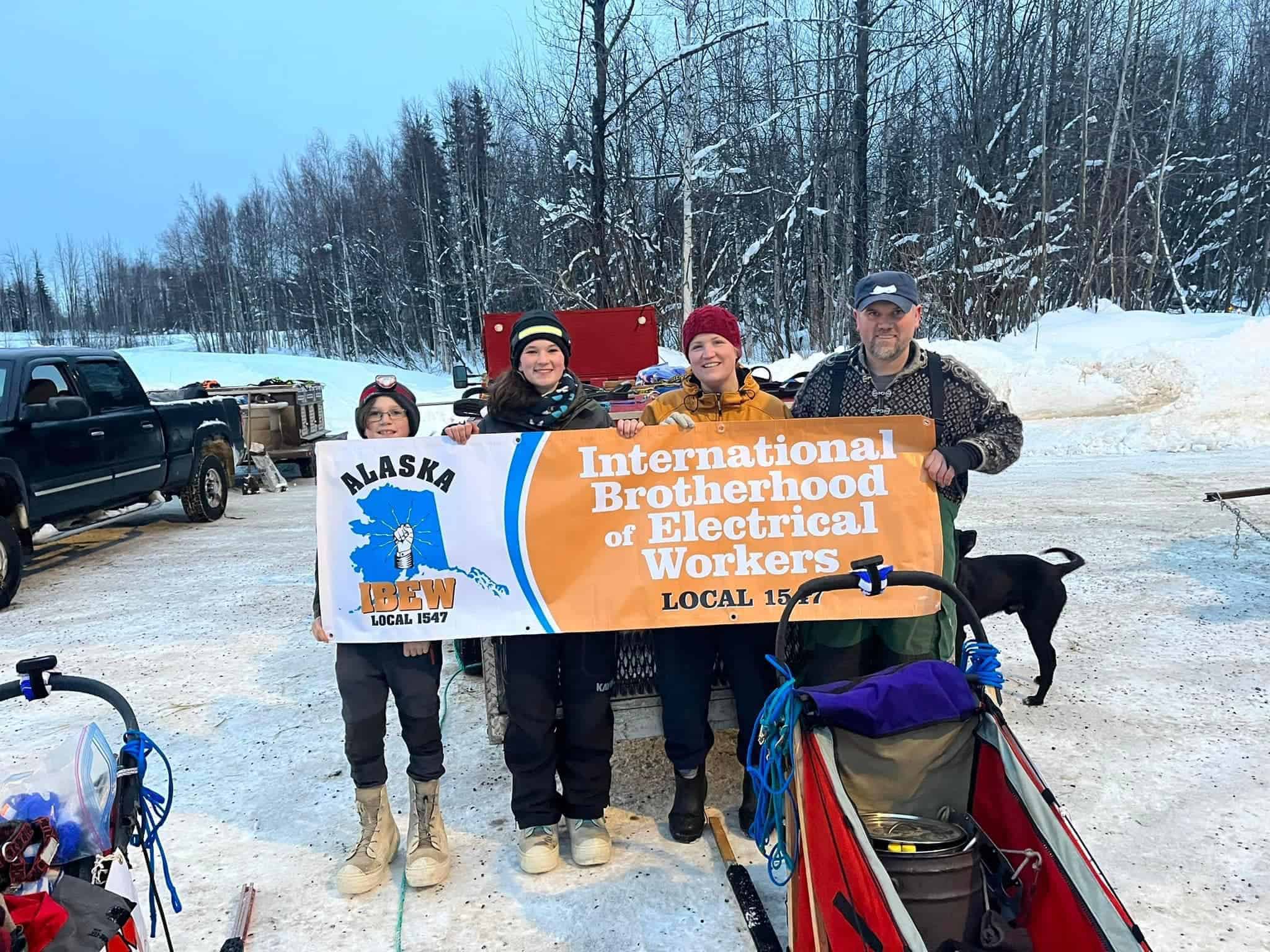
The whole Robinson family is involved in mushing and raising dogs.
In the Blood
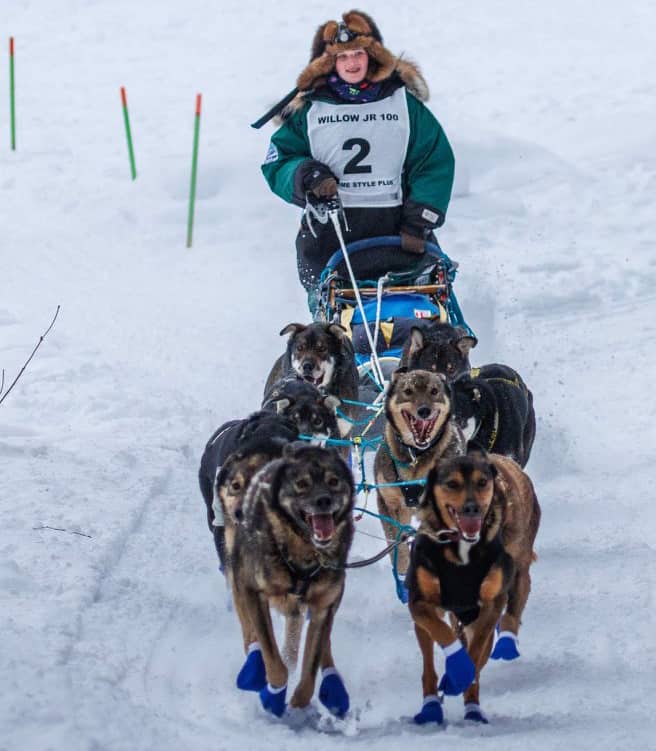
Emily Robinson – Jr. Iditarod Champion
Robinson lives in Nenana with his wife Alissa, his son Stanley (12), and daughter Emily (16). While Stanley is starting to mush on his own, Emily has become a force in the world of junior mushing. This past February, she won her third consecutive Jr. Iditarod Championship. Not to be outdone, Stanley placed second in the Willow Jr. 100, a race that covers 100 miles of Alaskan wilderness. He was only 12 minutes behind the winner, who happened to be his sister.
The entire Robinson family is involved in the day-to-day operations at the kennels. Emily and Alissa run sled tours in the winter. When Wally is working, to get the dogs in shape for the winter season, Alissa and the kids hook the dogs up to a four-wheeler and start running laps on logging roads.
“My mom is the engine of this operation,” Emily said. “She’s the one who keeps everything in place.”
Wally got the kids into mushing, trapping, hunting, and fishing as soon as they could hold a leash, rod, or gun. Both kids have killed moose for the freezer. “We have gone on many trips ever since I was 2 or 3, when it was 40 below,” Emily said. “Some dads just don’t take their kids on trips with them; they keep them at home while they hunt moose. I’m grateful that he drags me along with him on those trips.”
Wally quickly points out that living in Alaska and mushing is great for his kids. “From a parent’s perspective, it’s awesome to see the kids get into it,” Robinson says. “It teaches them responsibility. You’re turning your kid loose in the wilderness. They are on your own. There’s no pit crew.”
Iditarod 2024
In early February, Robinson was having dinner with his neighbor, Crooked Creek Kennel owner, and musher Josh McNeal. McNeal had a shoulder injury and couldn’t compete in the upcoming Iditarod. He asked Robinson if he would run it with dogs from McNeal’s kennel.
Robinson had less than a month to prepare for the Last Great Race when he accepted the offer. Plus, he was 43. More than two decades had passed since he last ran the Iditarod as a rookie. Luckily, Robinson had been training for an ultra-race of his own—a 35-mile run where his parents live in Arizona. He canceled those plans and felt that had gotten him in pretty good shape. He added three lead dogs from his kennels to McNeal’s team. Plus, running the dogs fits with his personality. “I feel way more comfortable running the Iditarod and being in the woods than being in some city somewhere,” he said.
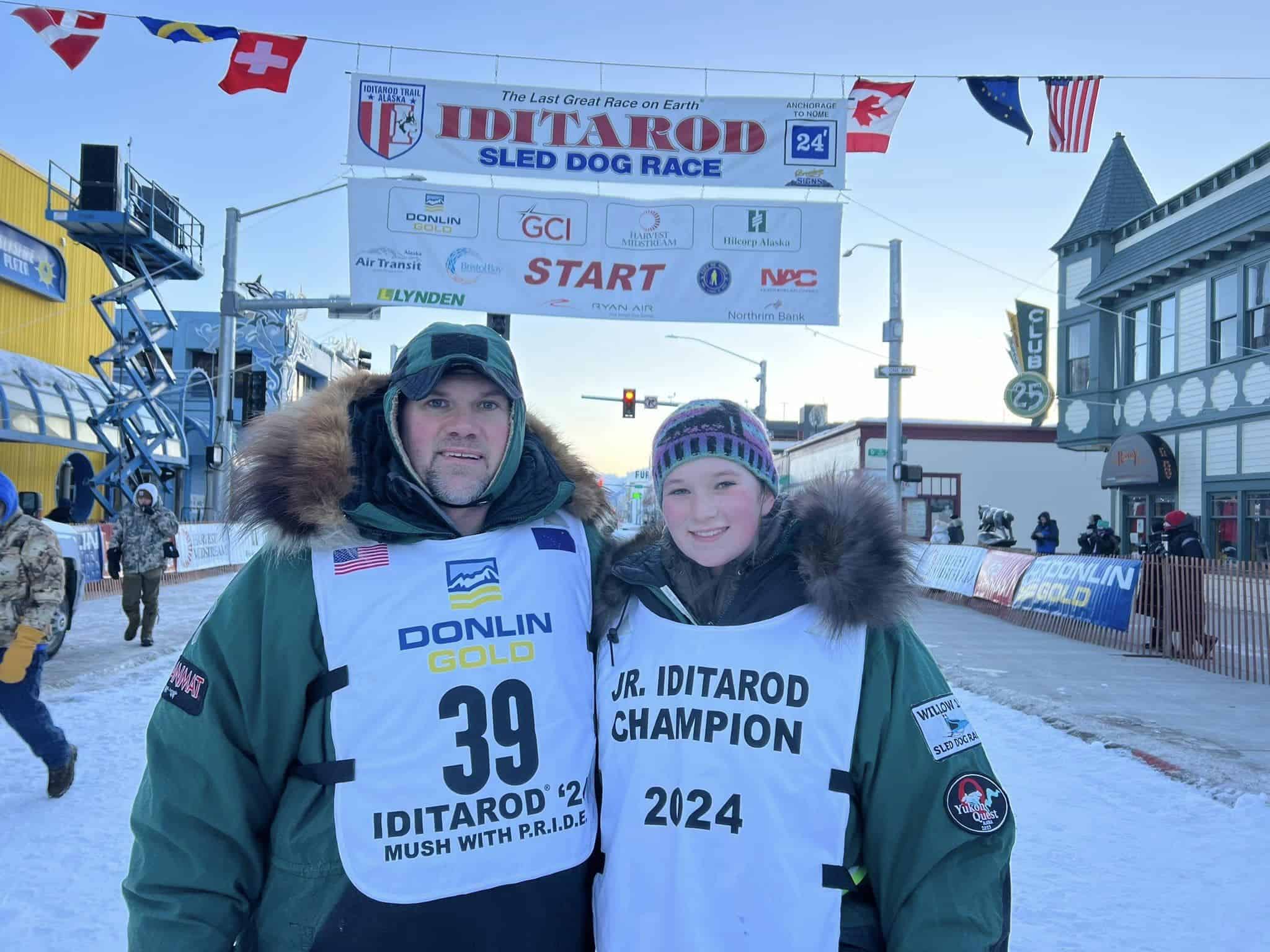
2024 Iditarod – Wally and Emily Robinson.
Even though mushers and their teams contend with subzero temps, icy trails, and floating sea ice, moose scare Robinson the most. “Moose can be a real threat because they’re on the trail where it’s packed down,” he said a week before starting the race. “And those moose will come in and stomp your team because they think it’s a pack of wolves.” Sure enough, moose were a serious factor this year.
Dallas Seavey, the eventual winner of the race was coming down a hill around a blind corner when he and his team encountered a moose. When the moose started kicking the dogs, he nearly emptied the cylinder of his .357 into the moose. It fell dead on the sled. One of his dogs had to be airlifted to Anchorage because of its injuries. Race rules state that when racers kill a moose to protect their team, they have to gut it to save the meat. Seavey gutted it but couldn’t drag the massive carcass off the trail. Robinson was behind Seavey and ran right over the carcass in the dark of night.
“There’s a lot to this sport,” Robinson said. “It’s not like you’re standing on the back of the sled watching dog butts all day.” These dog teams are high-performance athletes that eat high-end food like chicken liver, pork belly, beef, tripe, and salmon. The health of the dogs is paramount. At each checkpoint, a team of veterinarians evaluates the dogs. If the vets feel like a dog isn’t fit to run, they pull them. “These dogs are bred for a purpose, and their purpose is to run,” Robinson said. “They’re like the musher, and they want to see what’s around the next bend. My sled dogs get more exercise than 99.9 percent of household dogs.”
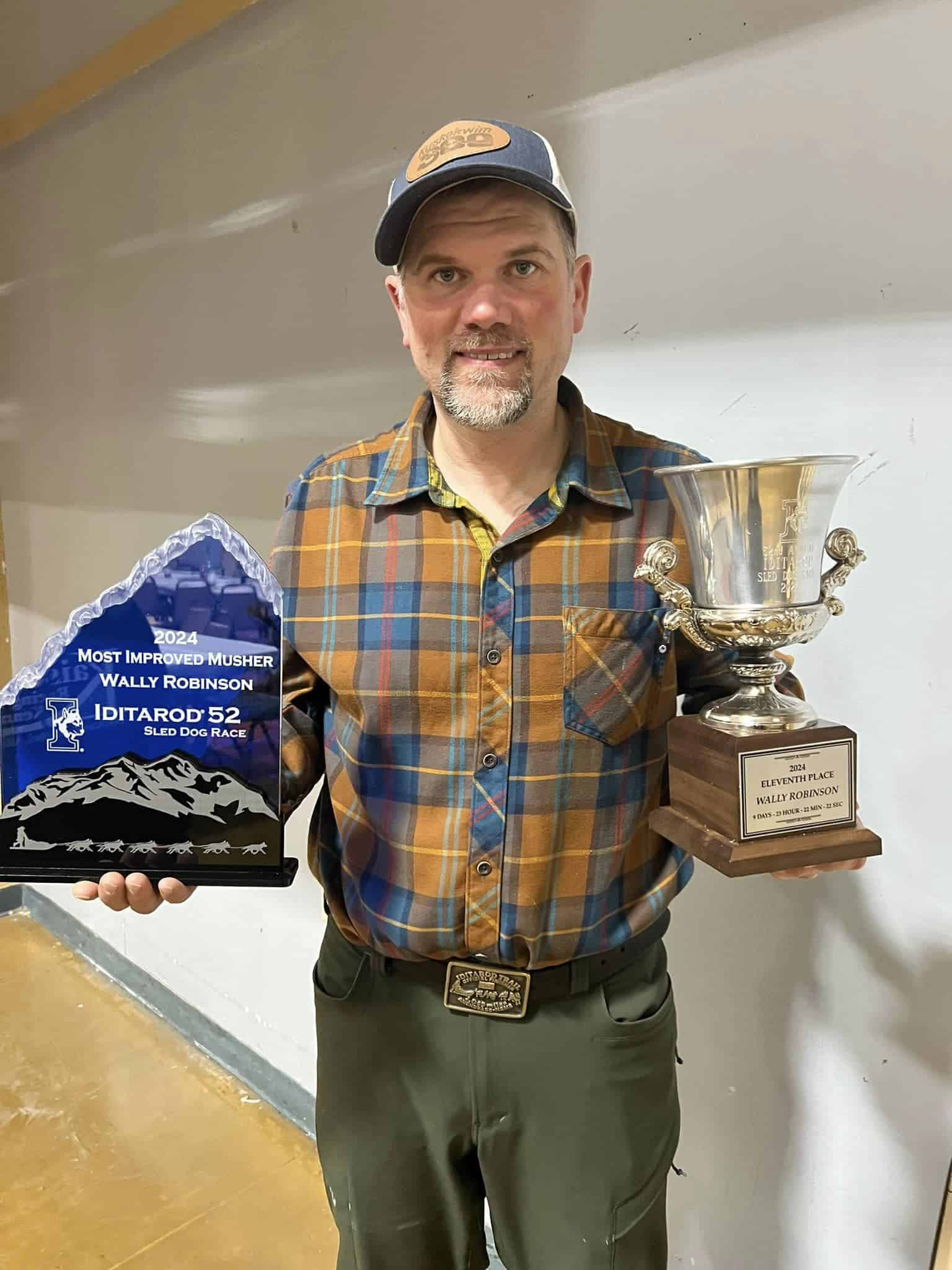
Robinson with Iditarod 2024 awards.
Those dogs pulled him 1,000 miles in just under ten days to cross the 2024 Iditarod finish line in 11th place. He was only nine hours from the top spot. Robinson started with 16 dogs and ended with 14, the most of any competitor finishing the race. At the finish line in Nome, his family and McNeal (who hatched this idea only a month prior) were there to greet him. “He’s done absolutely incredible this race,” said McNeal. I couldn’t be more proud of him and the dogs.”
Robinson’s meticulous care of the dog team earned him the Leonhard Seppala Humanitarian Award, given by the race veterinarians to the musher who takes the best care of their dog team during the race. He also won the award for most improved musher.
As for his future in the Iditarod, Wally wasn’t sure he would be crossing the finish line next time. “You’ll probably see a Robinson,” he said. “It probably won’t be me, but you’ll definitely see a Robinson.”







